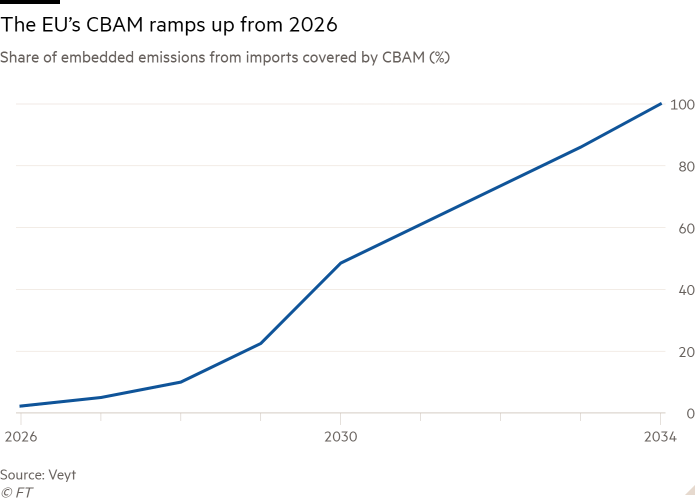Unlock the Editor’s Digest for free
Roula Khalaf, Editor of the FT, selects her favourite stories in this weekly newsletter.
A new EU carbon tax on electricity will lead to increased CO₂ emissions in Europe and cause a jump in prices for consumers in the bloc, the energy industry has warned.
The bloc’s Carbon Border Adjustment Mechanism (CBAM), which takes effect in 2026, will also reduce North Sea energy co-operation between Britain and Europe and deter investment in renewables infrastructure, according to an industry analysis of the tax.
“CBAM is becoming a regulatory nightmare,” said Adam Berman, deputy director of the industry lobby group Energy UK. “Putting an unwarranted carbon price on electricity exports to the EU sends a clear negative investment signal for North Sea infrastructure.”
Analysis by consultants AFRY warned that the CBAM risked reducing EU imports of green electricity from Britain, leading to additional carbon emissions in Europe equivalent to up to 8.3mn cars a year.
The study also showed that the CBAM, which imposes a tax on a range of carbon-intensive products, will significantly drive up the price of electricity traded between the UK and the EU via interconnector cables.
Energy UK warned that as currently designed the mechanism would in effect impose a 40 per cent tax on electricity flowing from the UK to the EU, leading to a jump in prices for European consumers.
Since Brexit the UK and the EU have had separate carbon-pricing schemes, meaning that British exports to the EU will face taxes on the embedded carbon in a range of products, including steel, cement, fertiliser and electricity.
Under the CBAM, countries that want to export to the EU must from 2026 show that they have an equivalent carbon price in place, or pay a tax to make up the difference. The aim is to level the playing field with countries that have less stringent emission controls.
A specific issue arises with electricity exports, the energy industry says, because it is not possible to separate out power generated by green methods, like wind and solar, from power generated by traditional gas-fired stations.
This means a flat tax will be imposed on UK electricity based on what critics say are outdated calculations of its carbon content.
On current projections the EU tax will be based on an assumption of 463 grammes of CO₂ per kilowatt hour in 2026, despite UK electricity being generated at less than 80g CO₂/kWh for half the time and always less than 300g CO₂/kWh, according to the AFRY analysis.
Simon Bradbury, senior principal at AFRY, said the effects were already visible in the futures market for electricity. “Action is needed now to address the issues identified,” he added.
Rebecca Sedler, the managing director of National Grid Interconnectors, said the carbon tax could “significantly reduce” exports of British electricity to the EU, which would be “self-defeating” given the EU and UK’s shared ambitions on reaching net zero.
“The application of the CBAM on electricity exports could discourage future development of interconnectors and offshore hybrid assets in the North Sea, which are vital tools in the transition to a greener energy system,” she added.
The Danish transmission system operator Energinet said that it expected electricity imports from the UK to “drop significantly” once the carbon border tax was imposed.
“That will require the EU to rely more on domestic production, which could see prices increase as well as the use of gas for electricity generation,” it said, adding that in the long term co-operation with the UK on offshore energy in the North Sea “will be much less financially viable”.
The industry is calling on both the EU and UK to take steps to avoid CBAM having the perverse consequence of deterring the export of UK green electricity to the EU, which would otherwise help the bloc reach its net zero targets.
In the short term, the industry wants the CBAM on electricity to be calculated in a way that more accurately reflects its carbon content.
Longer term, the industry has called on the UK and EU to open discussions on legally relinking their carbon markets, avoiding the need for CBAM on Britain’s exports to the EU.
“We would like to see the UK and EU start discussions on linking their respective emissions trading systems,” said Sedler of National Grid Interconnectors.

Bart Goethals, the chief commercial officer of Nemo Link Ltd, which operates the interconnector linking Belgium with the UK, warned that the CBAM risked creating “a very significant trade barrier”.
“Political will is urgently called upon to get the identified issues addressed and an EU CBAM exemption for the UK, for example by relinking the EU and UK Emissions Trading Schemes,” he said.
EU officials declined to comment on the AFRY study, but said that the European Commission would continue to engage with the UK while CBAM is on a trial phase ahead of it coming fully into force from 2026.
The UK Treasury said it was seeking clarity from the Commission over the practical implementation of the EU CBAM for trade in electricity, “given the challenges involved”, adding it would continue to engage with Brussels.
Climate Capital

Where climate change meets business, markets and politics. Explore the FT’s coverage here.
Are you curious about the FT’s environmental sustainability commitments? Find out more about our science-based targets here











